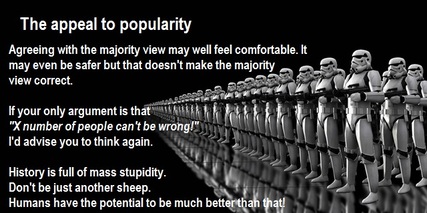
Appeal to Tradition
The first of these is to claim that something is right because it has a long tradition– within ethics this might be, for example, arguing that humans have been eating animals for the whole of human history and so it would be silly to stop doing it now. Or, to take a pertinent political example, some are arguing that Scotland should stay part of Great Britain because the Union has been in place for over 250 years; how can you just throw away all that history?
This kind of argument has a natural appeal because people often look back to the past through rose tinted spectacles. Many like to imagine that things were somehow better, more honourable and more decent in the past. Things with long traditions are given great kudos and seen as intrinsically valuable. Whilst it may be true that some things do fall into this category, it is certainly not the case that all things do. Take for example the tradition of slavery, subjugation of women or homophobia. Not many would seriously make the argument that these things are good because they have a long history within human societies! Just because something his a long tradition does not make it good per se.
Another irrelevant appeal is the appeal to popularity – this is saying that something is right because the majority of the population agree with it – “it can’t be wrong if that many people think it is right”! One example could be someone, when debating Euthanasia, making the case that it should be legalised because most people say they would like the option of ending their own life when they want. This does not make the argument valid all it does is make the argument popular!
Take the example of Racism; the majority of people who lived in Britain at the turn of the 20th Century did not believe that members of other races should be afforded the same rights as white people – there was a great deal of what we would now call racism. Does that mean that racism was permissible then? Most people would not be happy with this argument and prefer to argue that racism is intrinsically wrong; wrong in and of itself.

Appeal to religious authority
Finally we might consider another form of irrelevant appeal; appeal to religious authority. This is when someone argues that an ethical principle or value judgement is right purely on the basis that it is contained somewhere in a religious text or oral tradition. I am not saying that all religious arguments are fallacious – only when they rest solely on the basis of religious authority.
A very simple example would be that of stealing; is it good enough to say it is wrong just because it is one of the Ten Commandments is “Thou shalt not Steal”? Surely factors such as the inability to universalise the action make it immoral (Kant’s view) or the consequences of stealing have to be considered when deciding if it is immoral (Utilitarianism)?
In reality the reason why moral laws such as not stealing have made it into most religious codes is because the logical arguments for them are very good and so they have been adopted by religious communities.
Lazy arguments
What all irrelevant appeals have in common is that they are lazy arguments – they do not require much thought or effort on the part of those who make them. They come effortlessly from society, or tradition or religion and can be trotted out too easily. Do not be lazy yourself and not challenge them!!
Do you want to challenge anything I have said in this post?



 RSS Feed
RSS Feed
